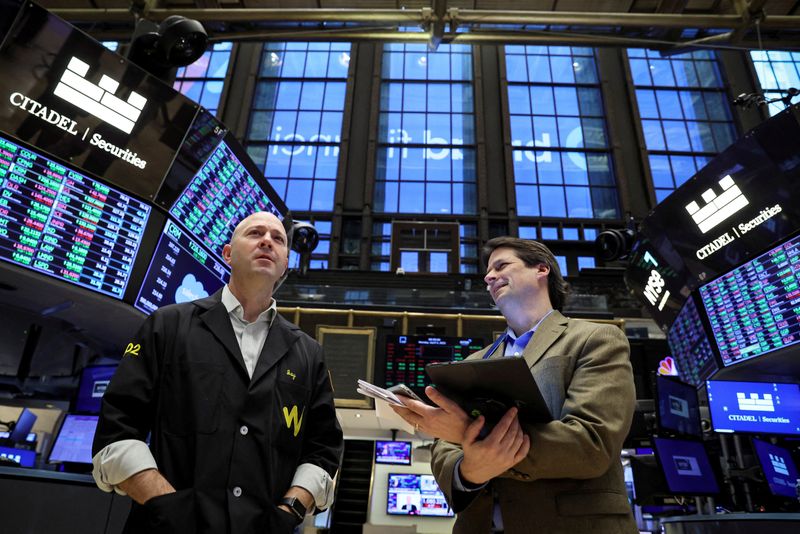Investing.com -- US stock futures inched down on Friday following a furious, record-setting rally on Wall Street in the previous session. Appetites for technology stocks and other risky assets were whetted by the Federal Reserve's super-sized interest rate reduction earlier in the week, while fresh jobless claims data bolstered hopes that the lower borrowing costs will support labor demand without re-fueling price pressures. Meanwhile, the Bank of Japan keeps interest rates steady and Nike (NYSE:NKE) announces the upcoming departure of Chief Executive John Donahoe.
1. Futures dip
US stock futures edged lower on Friday after equities on Wall Street, buoyed by a jumbo Federal Reserve interest rate cut, hit record highs in the prior session.
By 03:19 ET (07:19 GMT), the Dow futures contract had shed 32 points or 0.1%, S&P 500 futures had dropped by 10 points or 0.2%, and Nasdaq 100 futures had shed 49 points or 0.2%.
The main averages on Wall Street rallied on Thursday, boosted by the Fed's decision to roll out an uncommonly large 50-basis point slash to borrowing costs and signal the beginning of an easing cycle. The benchmark S&P 500 gained 95 points or 1.7%, the tech-heavy Nasdaq Composite added 441 points or 2.5%, and the 30-stock Dow Jones Industrial Average advanced by 522 points or 1.3%.
Sentiment was also bolstered by data showing that weekly jobless claims had fallen to a four-month low. The figures, which were also below economists' estimates, fueled hopes that the drawdown in interest rates will keep a lid on unemployment without sparking a resurgence in inflation. US government debt sold-off following the data, pushing benchmark 10-year Treasury yields higher.
"[F]or the time being, fundamental news flow is still favorable (disinflation, resilient growth, rate cuts, and healthy corporate performance), which should keep a bid beneath stocks," analysts at Vital Knowledge said in a note to clients.
2. Central bank decisions in Asia
The Bank of Japan left interest rates unchanged as widely expected on Friday and upgraded its outlook for consumption, in a sign that it continues to expect moderate growth in the Japanese economy.
The BOJ kept its key short-term rate at 0.25%, with all nine members of the rate-setting board supporting a hold. The decision was in line with market forecasts, with the BOJ tipped to adopt a wait-and-see approach after raising borrowing costs twice so far this year.
But the central bank still flagged “high uncertainties” over Japanese economic activity and prices, and said that volatility in foreign exchange markets was likely to affect local prices more than in the past.
Elsewhere, the People’s Bank of China kept its closely-monitored loan prime rate (LPR) steady, but is expected to eventually trim it further amid weak recent economic conditions in the country.
The PBOC kept its one-year LPR at 3.35%, while the five-year LPR, which is used to determine mortgage rates, was left unchanged at 3.85%.
3. Nike CEO to step down
Shares in Nike rose in extended hours trading after the athletic apparel firm announced that Chief Executive John Donahoe will set to step down from the position next month.
Donahoe will be replaced by Elliott Hill, who previously spent more than three decades at Nike in various senior leadership roles, including a stint as president of its consumer and marketplace unit from 2018 to 2020. Hill will take over at the helm of the company on October 14.
In a statement, Donahoe said: “It became clear now was the time to make a leadership change, and Elliott is the right person. I look forward to seeing Nike and Elliott’s future successes.”
The announcement comes after Nike has seen its market share eroded by new competitors like On and Hoka. In June, the group issued a sales warning for its core products, sending its stock price down by 20% at the time.
Wall Street analysts have wondered if Donahoe, a former technology industry executive who had helmed eBay (NASDAQ:EBAY) and ServiceNow (NYSE:NOW), was the right fit to run a consumer products brand.
4. FedEx (NYSE:FDX) cuts annual guidance
Shares in FedEx sank in extended hours trading after the logisitics group cut its full-year guidance and reported fiscal first-quarter earnings that fell well short of Wall Street expectations.
For fiscal 2025, the company narrowed its outlook for adjusted earnings per share (EPS) to a range of $20.00 to $21.00, down from $20.00 to $22.00 previously. Revenue growth for the year was now expected to come in at a low single-digit percentage year-over-year, compared with the prior forecast of a low-to-mid single digit percentage increase.
FedEx reported adjusted earnings of $3.60 per diluted share on revenue of $21.6 billion. Analysts polled by Capital IQ had anticipated EPS of $4.86 on revenue of $21.96B.
Federal Express, a key segment, saw margins fall to 5.2% in the first quarter from 7.1% a year earlier.
5. Oil on pace for second straight weekly gain
Crude prices slipped lower Friday, but were on track for a second consecutive higher week after the large cut in US interest rates helped quell some fears of slowing demand.
By 03:18 ET, the Brent contract dropped 0.4% to $74.60 per barrel, while U.S. crude futures (WTI) traded 0.3% lower at $70.93 a barrel.
The benchmarks have been recovering after they fell to near three year-lows on Sept. 10, and have registered gains in five of the seven sessions since then, including gains of over 4% this week.
Crude inventories in the US, the world's largest producer, fell to a one-year low last week, according to official government data earlier this week, but bigger gains were held back by persistent concerns over slowing demand, especially in top importer China.
